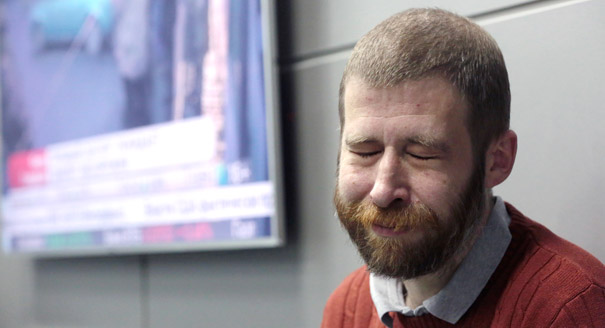Senior executives in Russia’s outspoken RosBusinessConsulting (RBC) media group have fallen foul of an unwritten code of conduct. The three senior editors—Elizaveta Osetinskaya, Roman Badanin, and Maxim Solyus—crossed the line by covering topics that the authorities had deemed to be off limits. They were all fired from their jobs on Friday, May 13.
Russian journalists are not supposed to discuss Vladimir Putin’s private life, disparage his inner circle, mention the president in the context of the Panama Papers scandal, or make disrespectful statements about the Russian Orthodox Church.
But this is what RBC did, and that spelled its demise sooner or later. The only thing that had kept the media company going was promises made by its billionaire owner, Mikhail Prokhorov, to his staff. Prokhorov, who ran for president on a liberal platform in 2012, wanted to own an influential media outlet, as he still harbored political ambitions. Eventually he selected RBC, which was ready to fill an empty online niche after the Kremlin had succeeded in purging the news websites Gazeta.ru and Lenta.ru.
The Kremlin did not engage initially with RBC, and its journalists were given hope because Prokhorov was a more independent figure than Alexander Mamut, who owned Gazeta.ru and Lenta.ru. For his part, Prokhorov was heartened by the example of other media outlets, which managed to persevere despite censorship.
Moreover, Prokhorov was considering the option of selling RBC. The strategy was clear: take a heavily indebted project, salvage it, make it respectable, and turn a profit. All this could work well in a country with true freedom of speech and political competition. In Russia, however, it was doomed to fail, as the last word always lies with the Kremlin.
Differences between the RBC editors and Prokhorov began to grow. The prestige of the news organization increased thanks to their journalistic investigations, which were frequently cited and followed up by the Western media. Naturally, the bigger the target, the more it boosted the profile of RBC and this eventually led them to take on Russia’s highest elite.
A media outlet such as RBC would have been a really valuable asset for a businessman or corporation that was competing for power or wanted leverage over the authorities in order to maintain or increase its wealth, as happened when Boris Yeltsin was president. But this wasn’t Mikhail Prokhorov’s modus operandi and in the new era both he and RBC stood out as unique. Besides, he was not interested in having a platform to promote an agenda of democracy and freedom of speech. Prokhorov chose never to go head to head with the Kremlin over his political projects.
As RBC became more influential and more frequently cited, it also became more toxic for its owner. Prokhorov in turn lacked patience with the project. He is quick to get excited about new initiatives, whether in business or in politics, but just as quick to cool off and abandon them.
A lack of attention also meant that RBC’s journalists were able to proceed with investigations as Prokhorov’s interest was waning. The less the oligarch cared about RBC, the more freedom the journalists had and the more daring their investigations became. With the rest of the media field almost clear of independent journalism, RBC’s publications stood out as increasingly provocative, even though many of them were based on publicly available data. The Kremlin expressed its displeasure to the businessman—first verbally and then by searching his office and opening a criminal case against RBC senior management. Prokhorov responded in his usual way—by pushing out the editors seen by the authorities as having overstepped the line.
The Kremlin decided that the RBC readership for investigative reporting on the president’s inner circle had grown too large. Photos of Vladimir Putin had started appearing next to reports about the offshore holdings of his friend, the cellist Sergei Roldugin, and that was beginning to spark the interest of formerly apolitical businessmen. The problem of corruption crept from the wings to center stage.
Putin himself has grown accustomed to the idea that media coverage of him and his family is off limits to everyone except outlets that he apparently views as marginal or hostile, but puts up with in order to maintain a certain image of tolerance in the West.
The Kremlin had cordoned off a kind of special ghetto for political protest and open criticism: several media outlets that can be described as “activist” in format. These might have a large audience—the Echo of Moscow radio station and website, for example—but the information in their reporting is drowned out by a deluge of radical opinions, both pro- and anti-Kremlin. Although Echo of Moscow editors talk about offering many points of view, they end up disconcerting their audience with a flood of information.
RBC—like Gazeta.ru and Lenta.ru before it—had a different approach. It presented information in a balanced way and also offered entertaining everyday materials with appeal to a wide audience alongside news and political analysis. RBC’s journalistic investigations were not opinion pieces—the Kremlin is still grudgingly willing to tolerate conflicting opinions. They focused on facts and strove to be objective.
The message from the Kremlin is that online media portals should stick to cat videos, crime reports, and criticism of Obama, European leaders, and the Russian opposition. Occasional ribbing of regional officials is permissible, but there is no space for negative comments about the president and the patriarch. Russia’s politicians have long accepted these principles. Soon, this will be the situation for the entire media space as well.



